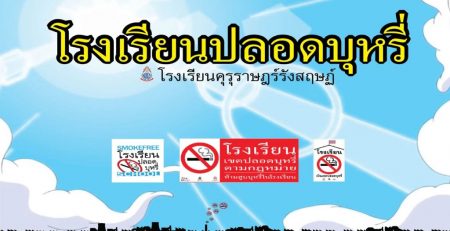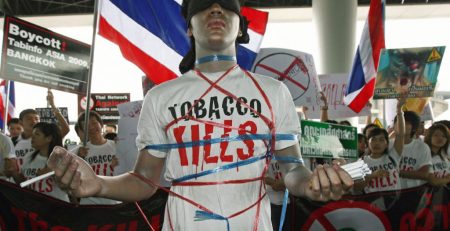Volunteers quit smoking
Nowadays, Thailand has a wide health network, the Public Health Volunteers (PHVs) network which has almost 1 million volunteer members. This health network?s role includes being health leaders. Aside from having health careers and conducting surveillance of various risks of health, especially for health promotion, PHVs have performed well doing their duties for a long time. For this reason, PHVs should be good health models in term of quitting smoking.
The Tobacco Control Research and Knowledge Management Center (TRC) provided funds to support action research on PHVs reducing and quitting cigarette smoking in 5 provinces: Phitsanulok, Prachinburi, Roiet, Chachoengsao and Yala. This action research found that most smoking behavior was among males. After knowing the smoking situation, a project of behavior change to encourage PHVs was performed to encourage PHVs to reduce and to give up smoking. When conducting an analysis of overall information, the findings showed that reasons for smoking by PHVs were to: (1) release stress, and (2) reduce emotions like moodiness, worry and lonely feelings. Some PHVs indicated that smoking helped them to get along with others in their social life, and some said they smoked because they were used to smoking. Activities conducted in community emphasized steps to behavior change such as providing knowledge, building good models, encouraging family members to support the smoker?s will power to succeed in quitting smoking, and providing care to people who need relationship support. The most important was support from family, especially in families having small children. Phitsanulok was an example where the percentage of male PHVs who were smokers was 44%. So, this province preformed 9 activities through 2 groups. The first group was to encourage knowledge activities for core people through methods such as establishing clubs, having knowledge exchanges, travelling to visit patients who had smoked, and through building will power and commitment to quit.
The second group was to stimulate action on environmental issues using social factors which emphasized social participation such as encouraging people through community activities, to participate in knowledge stage exchange, to praise others by providing certificates, building models and establishing campaigns in villages.
Results of activities conducted in Phitsanulok shows that some network groups were able to quit smoking, some intend to quit smoking, and some still have continued to smoke. The findings also showed that participating in society, especially will power boosted by family was important issue and helped smokers to quit smoking.
For Chachoengsao province, similar activities were performed at this province such as having knowledge stage exchange programs, boosting the will power of smokers trying to quit smoking, providing health checkups, and establishing charity activities. Moreover, results from interviewing sample groups indicated that there was 1 in 4 PHVs participating in quit smoking activities in the last 6 months and reasons for participating in the program was worry about their own health and then worry about the health of loved ones that are close to them. Some PHVs had previously intended to quit smoking. However, they found will power from their family members, especially their children and nephews who were very young, so they were able to succeed in quitting smoking. When considering Prachinburi province, it was interesting that in the past 80% of the target group tried to quit smoking, but they did not succeed in quitting smoking. For this reason, activities in this province began with providing knowledge of cigarette dangers and skills for quitting smoking for one?s self and others. The next step was to consult each other in the public sector to together set non ? smoking campaign plans. The last step was to establish non ? smoking networks in order to have knowledge exchange. After work performances of the program was evaluated, findings indicated that the reason the group could pursue the idea of quitting smoking was because of worry for the health of their family members. This encouraged them to quit smoking.
Yala and Roiet also had similar activities performed in their provinces including providing understanding and knowledge of cigarette dangers to PHVs, families and people living in these provinces. The purpose of these activities was to build understanding, and to encourage smokers who wished to quit smoking to have the will power to quit smoking by providing activities in various locations. The findings of work in the program showed that the important thing in driving smokers to quit smoking was that the sample group knew that smoking resulted in bad health conditions for them and loved ones close to them, especially for children. Moreover, if family members understood and supported the will power of smokers to quit smoking, smokers were presented with more reasons and opportunities to quit smoking. Activities that resulted in many reducing or giving up smoking were training, watching VDO of smoking impacts, and building quit smoking models so PHVs had roles for public health. When people were concerned about smoking dangers and strongly encouraged quitting smoking, smokers would succeed in quitting smoking. The success in quitting smoking in the sample group resulted from motivating activities, knowledge provision and family and social encouragement. Especially important was will power encouragement from family that led to strong intentions to attempt to quit smoking and be a good model in the community.
This lesson was reported by Harris Taweewattana












